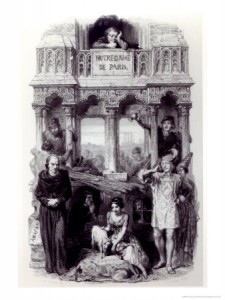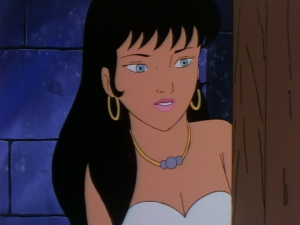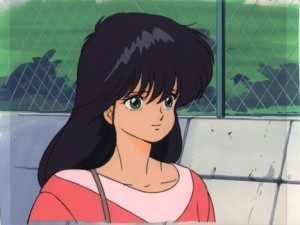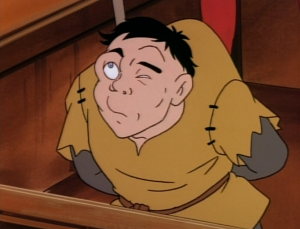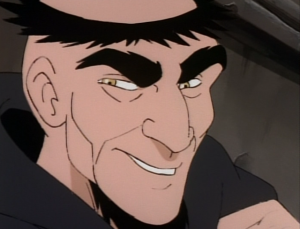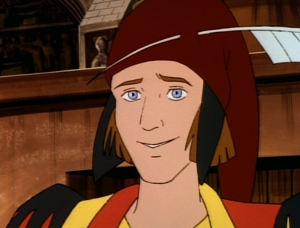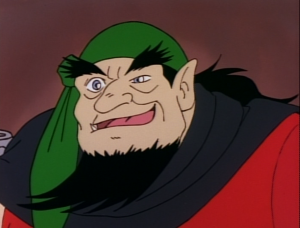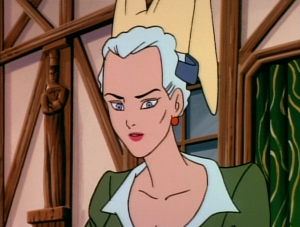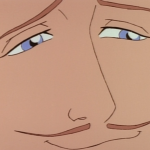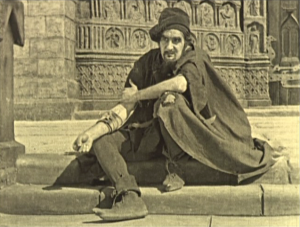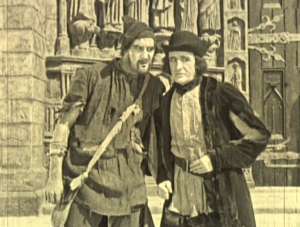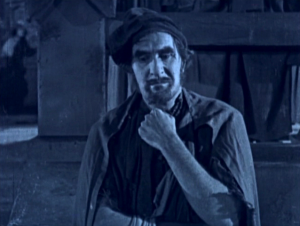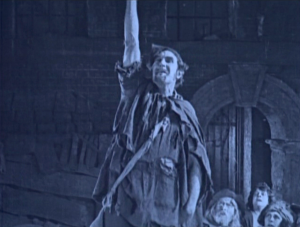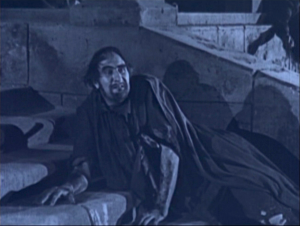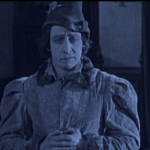The character design in the Jetlag version the Hunchback on Notre Dame is just as lazy and uninspired as the songs and the rest of the execution on this movie.
Esmeralda is probably the most designed character in this version. I think that the designers tried most with her relative the other characters. However the designers are guilty of putting her red and they made her look too sexy. They put her in a strapless corset and a long red skirt with a slit that goes all the way up her leg. Her clothes are just wrong for the time period. But at least she is pretty.
However she looks at lot like Madoka Ayukawa from Kimagure Orange Road, a Japanese anime from the 1980s. It actually get a bit detracting because she is the only character in this that has an anime look. It maybe because she is a gypsy and they wanted her to look distinct but the difference of animation style looks more sloppy than stylistic.
Quasimodo looks a little more normal that he normally depicted. He has the hunch, a closed eye and a large protrusion over said eye. But he doesn’t read as ugly or deformed as he does in other versions. This one of the few times that he doesn’t have red hair instead he has black hair. The black hair reads more boring but that’s okay because Quasimodo’s look is boring in this version.
As I said in the voice acting post, Frollo sounds like Gargamel from the Smurfs and he kind looks like him too. Frollo has more hair though. Frollo has a tonsure which is a nice trait but it’s not gray at all which was a major trait of Frollo’s in the book. He look oldish and austere but not in the some capacity as the book or in the Disney movie. Like Quasimodo his character design is just boring.
Gringoire’s character design wins the award of the most boring design. His design is like ambien, it’s sleep inducing. Most of the extras have more interesting designs.
Phoebus in this version has a mustache and looks fairy believable as a late medieval soldier. But for some reason he has reddish-pink-brown hair, which looks really silly. Phoebus typically has blond hair to reference his name sake. His hair color in this version seems out of place.
The Duke of Egypt looks like a monster. Why does he look like a monster? I have no clue. His design baffles me. If he was the villain I could understand it but he is hardly a side character. So why does he have pointy elf ears, upturn fangs and a general monster look. My guess is he was a left over design from another project and they just went with it. Because while his design is at least interesting it doesn’t fit in to the context of this movie or his “character” (he doesn’t have much one).
Fleur de Lys looks old. For some reason she has white hair and a receding hairline. She at least has a henin headdress (the pointy princess hats) so at least they got something right from the period. Her look is cold and austere which is in contrast to Esmeralda’s but Fleur de lys is suppose to look old? Why does this movie has some aversion to blond hair. Blond hair on her would have look worlds better.
Next Jetlag Article – Animation
Clopin is the most complex character in the 1923 version of Hunchback of Notre Dame. He’s conniving yet caring. In this version like in most every other version, Clopin is merged with the Duke of Egypt, one of the leaders of the Court of Miracles, leader of the Esmeralda’s group, and Esmeralda’s protector. In in role as the Duke, Clopin is Esmeralda’s adopted father. She is the only person that can soften his heart.
Clopin in the version also has a partnership with Jehan. The nature of their friendship is never explain. Jehan tries to get Clopin mobilizes the Court of Miracle against the nobles and Jehan try to tempt Clopin with gold of Notre Dame in exchange for Esmeralda. The basis for their interaction could be taken from the La Esmeralda Opera Libretto that Hugo wrote in which Clopin works with Frollo and was the one to hide in the room when Esmeralda and Phoebus has their encounter. It could also be that Jehan does join the Court of Miracles in the book though he never interaction in Clopin. Or it could that it is mention in the book by Gringnoire that the Duke intends to sell Esmeralda to “gentlemen priest.”
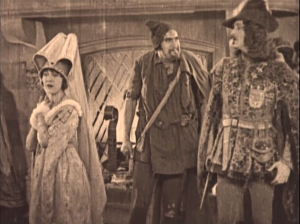
Clopin (Ernest Torrence), Esmeralda (Patsy Ruth Miller) & Phoebus (Norman Kerry) 1923 The Hunchback of Notre Dame
Clopin is also the one driving the social class sub-plot a.k.a the beggars vs the Nobles. It very similar to the 1939 version but in the 1939 version there were stakes, the nobel wanted Esmeralda out of Notre Dame here one noble just wants to marry. So basically it’s Clopin complaining and then getting mad when Esmeralda and Phoebus form a romantic attachment which for him is the ultimate insult.
It’s not wholly the films fault that this sub-plot doesn’t go very far. It’s actually because the copy that survives today is sixteen minutes shorter that the original. Most of these sixteen minutes were comprised of Clopin and one scene with Quasimodo gets clothes for Esmeralda, which is the scene where a prominent picture of Quasimodo was taken, so prominent in fact that it’s on the spine of the DVD. As result of Clopin’s role is much smaller than the film intended. However you can see some pictures and read the script in the Riley’s Book which is published with Pasty Ruth Miller’s Autobiography
, both of which are good reads if you a fan of the 1923 version or Miller’s or of old movies/Hollywood.
Clopin’s character suffers a lot from the cuts made to the film but even with the cuts is he the most complex characters in the film and he at least interesting and memorable.
Next Time – Gringoire

